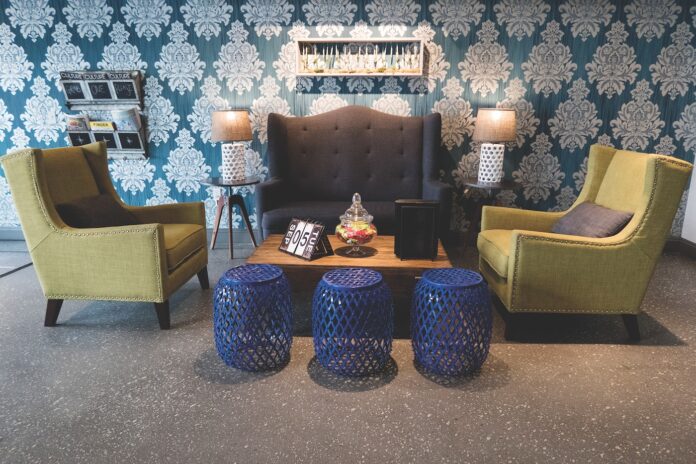When you check in at a spa, it’s not unusual to be offered a bubbly refresher before your treatments. Nor is it uncommon to pop down from your hotel suite for a nightcap at the lobby bar. Indeed, a drink before and after a meal is so commonplace we’ve borrowed the French phrases aperitif and digestif. Alcohol pairings and hospitality go hand in hand.
It’s almost impossible to imagine a world where your favorite seltzers, beers, and liquors are available only at retail stores, never at restaurants, bars, or lodging establishments. Yet this is exactly where the cannabis industry finds itself, even in states where recreational use has been legal for years.
So what’s preventing the next logical step of creating a cannabis hospitality paradigm? The picture is more complex than most people may realize.
In urban planning, a requisite is “third places”: non-home, non-work places where one can savor public life. As adult use becomes commonplace, consumers increasingly are hungry for third places that are cannabis-friendly, hoping to enjoy their favorite products outside the confines of home just as coffee and cocktail aficionados do at cafés and bars.
For travelers visiting popular destinations from Los Angeles to New York City, consumption-friendly hospitality spaces would get tourists out of the legal gray area they currently occupy. Many municipalities ban public consumption, meaning out-of-towners technically shouldn’t even take a pre-roll outside their non-smoking hotel room for a walk around the block or through the neighborhood park.
Of course, many lodging establishments don’t afford a private space to consume, either, and threaten hefty cleaning fees for guests who toke or vape anyway.
Many of the regulations preventing the cannabis hospitality sector from moving forward are related to indoor-air-quality laws designed to protect workers from inhaling secondhand tobacco smoke and other pollutants. In many states, cannabis legislation was envisioned with public consumption spaces as part of the legal landscape. However, regulators haven’t always been as proactive about bringing them to fruition. Even where there are license categories in place for potential hospitality entrepreneurs, zoning, air quality, slow regulatory buildout, and lingering stigma present complex barriers.
For example, it’s taken more than six years for Massachusetts lawmakers to establish a regulatory process for social consumption sites—although a pilot program sat on the books for four years before a new lineup of commissioners scrapped it.
In my home state of Colorado, hospitality entrepreneurs are still working through the red tape and emerging landscape after state lawmakers allowed for consumption establishments in 2019. Colorado now offers a few types of hospitality licenses ranging from BYOB (bring your own bud) to more integrated options. For instance, the combined Retail Marijuana Hospitality and Sales Business license allows operators to sell products to their patrons for consumption directly on the premises. In 2023, the city of Denver also approved a new mobile-consumption license that legalizes toke-friendly party buses.
But the regulatory patchwork and hesitancy by lawmakers has left cannabis hospitality in limbo, even as the industry struggles with a “grass ceiling” of oversupply, excessive taxation, and limiting legislation in the retail sector. Plenty of spas, hotels, and restaurants have added CBD offerings such as specialty massages and facials, infused candies in lieu of the traditional pillow mints, and hemp IPAs, coffee drinks, soft serve, and cocktails.
Where’s the THC equivalent of these flourishes? Even in culinary and cannabis capitals like San Francisco, legislators still struggle to get infused food, drinks, and events on the civic menu a la Amsterdam’s famous coffeeshop model.
Meanwhile, high-minded tourists have turned to private-owner booking services like Airbnb and Bud and Breakfast to find 420-friendly lodging in a climate that prevents traditional hotels from offering the same on-site consumption perks.
But change is finally happening. For example, Chris Chiari, the visionary behind Denver’s historic Patterson Inn, has been working to add a licensed indoor consumption lounge, making him the first Colorado hotel owner to apply for a cannabis hospitality business license. However, reaching a consensus with the city on the building’s HVAC design has proved challenging.
Zoning is another issue. Jad’s Mile High Smoke, the first consumption lounge to open in Colorado (in 2022), sits just outside Denver in unincorporated Adams County, where foot traffic is a lot lighter than nearby downtown.
The state of Nevada is ahead of the curve with the 2021 Assembly Bill 341, which provided the Nevada Cannabis Commission the terms by which to license and regulate both retail and independent consumption lounges. Las Vegas already makes headlines for its burgeoning cannabis tourism sector, even as operators push back against zoning restrictions like a mandatory 1,000-foot buffer between consumption lounges.
Freeing the industry to expand beyond dispensaries into public consumption spaces, lodging, dining, party buses and group tours, spa services, retreats, and more categories is one way to alleviate the down markets and tax bubbles currently plaguing many legal states. Consumers are ready in many major travel destinations and fast-growing metro areas, and others just need to be educated about the issue to see how breaking through the grass ceiling could generate revenue for the community at large, not just cannabis businesses.
Making the necessary regulatory changes, however, will take public input and pressure. That can look like convincing city and county commissioners to see the value in setting up licensing structures for such businesses. It also can look like advocating for social-equity programs and pushing lawmakers to walk their talk. After all, one barrier existing business models face is finding investment money, insurance, and safer cash handling through banking. Those capital limitations can have an even greater impact on the very social-equity applicants many hospitality licensing programs are structured to benefit. Even if a formerly justice-involved individual can get a consumption lounge license, if they don’t have access to other necessary resources to build a successful business, the cannabis hospitality sector will never actually grow.
That’s why it’s important for cannabis stakeholders and entrepreneurs in adjacent industries to take an active role in advocating for common-sense legislation to make cannabis hospitality a viable model. There is still enormous white space for business growth—not to mention American cities poised to become the new Amsterdam.
It’s up to operators to convince lawmakers to open the door fully. The first step is reaching out to local, state, and federal representatives to create a sense of both urgency and possibility.














